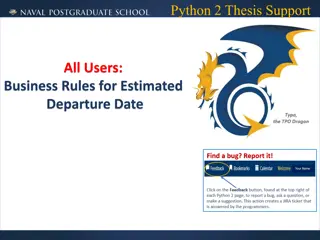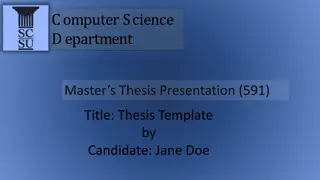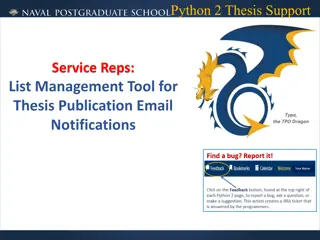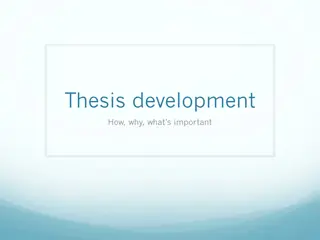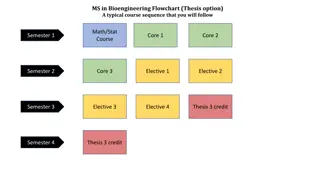
Automated Unit Testing Tool for Complex C++ Programs
Explore CLEMENTINE, an automated unit testing tool developed to support complex features of C++ programs, enhancing test coverage for a wide range of target programs. Learn about its testing methodology, comparison with other tools, and the impact on object-oriented programming.
Download Presentation

Please find below an Image/Link to download the presentation.
The content on the website is provided AS IS for your information and personal use only. It may not be sold, licensed, or shared on other websites without obtaining consent from the author. If you encounter any issues during the download, it is possible that the publisher has removed the file from their server.
You are allowed to download the files provided on this website for personal or commercial use, subject to the condition that they are used lawfully. All files are the property of their respective owners.
The content on the website is provided AS IS for your information and personal use only. It may not be sold, licensed, or shared on other websites without obtaining consent from the author.
E N D
Presentation Transcript
Automated Unit Testing Tool for Complex C++ Programs Irfan Ariq Advisor: Prof. Moonzoo Kim School of Computing - KAIST
2 Introduction Testing C++ Programs C++ is one of the most popular programming language and it has been widely used in many domains Here are some examples of program written in C++: However, there are almost no automated unit testing tool for real-world C++ programs that support C++ complex feature (e.g., standard template library (STL) classes, template instantiation, complex object oriented features etc.) Thus, CLEMENTINE was developed to meet that needs (i.e., automated unit testing tool that support C++ complex feature)
3 Introduction CLEMENTINE CLEMENTINE is an automated unit testing tool based on method sequence generation Method Call Sequence Generation: Test case generation example: 1. CLEMENTINE randomly selects one target function(in this example, SetValue is selected). 2. CLEMENTINE recognizes the requirements to invoke the function. To invoke SetValue, CLEMENTINE requires: 1. a Number instance, on which SetValue will be invoked 2. an argument item of type int 3. Then, CLEMENTINE constructs the call statement (i.e. SetValue) with all of its supporting argument-constructing statements. // Target Program Code 1: class Number{ 2: public: 3: void SetValue(int val) { 4: ... 5: } 6: private: 7: int value; 9: } // Test Case Code 1: int main() { 2: Number number1; 3: int int2 = 255; 4: number1.SetValue(int2); 5: return 0; 6: } Line 2 creates an instance of Number Line 3 creates an int variable Line 4 calls the target function
4 Comparison of CLEMENTINE with Previous Approach Comparison with other tools to target C++ programs is listed in the following table. Auto. Driver? Support C++ Features*? Support Object Oriented Features**? Tool Year Remark KLEE 2008 system-level testing tools AFL 2013 FUDGE 2019 automatic fuzz driver synthesis for library APIs FuzzGen 2020 IntelliGen 2021 KLOVER 2011 FSX 2016 automatic unit test generation for C++ CITRUS 2021 UTBotCPP 2022 CLEMENTINE 2023 * Support C++ Features: handling template instantiation, STL classes, implicit constructor, and so on. ** Support Object Oriented features: testing non-public member function, testing method that has internal linkage
5 Thesis Statement The thesis statement of this work is written as follows: Automated C++ unit testing can improve its test coverage for broad range of target programs by handling complex object-oriented features in C++ programming languages
6 Contribution I have classified 20 types of C++ functions that are not properly handled by the previous tool (CITRUS, an automated C++ unit testing framework developed by KAIST SWTV group) due to the complex C++ features and developed solutions for 16 of them. I have improved the applicability of an automated C++ unit testing framework by addressing the 3 limitations in the design choices of CITRUS. As a result, CLEMENTINE successfully generates valid test cases on 4 target subjects that CITRUS failed to handle I have performed experiments to empirically demonstrate the advantage of CLEMENTINE on the 16 C++ real-world open source programs. CLEMENTINE achieved : up to 96.6% function coverage, up to 77.6% branch coverage, up to 95.3% statement coverage
7 The CLEMENTINE Framework CLEMENTINE Pre-processing Test Case Generation(main loop) Create TC 1) Generate from scratch 2) Mutate existing TC Program Model 1) List of function 2) List of types (e.g., class, enum) Target CPP Create TC Template Code Test Case File Post-processing Get Compile Command Build Discard TC Fail Compilation Database Libfuzzer Test Drivers (compile & link) Libfuzzer Test Driver Writer Success No Effective TCs Get Link Command Increase coverage? Exit normally Yes Execute Effective TCs Crash No List of Build Commands Google Test Format Writer Crashing TCs Yes New Crash? Crashing TCs
8 Three Limitations of The Previous Approach (CITRUS) 1. Method Redefinition Problem due to Including All Header Files 2. User Given Linking Configurations Required 3. Many Not-Properly- Handled Functions CITRUS // Implementation Code(impl.cpp) #include header.hpp" testcase.o static void h() { ... } namespace { void func_anonnamespace() { ... } } class internal { public: void method1() { ... } void method2() { ... } } objB.o // file : testcase.cpp #include header1.hpp #include header2.hpp #include header3.hpp ... Linking TC clang++ objC.o objA.o int main () { ... return 0; } ... testcase.exe
9 Limitation #1 of the Previous Approach (CITRUS) Method Redefinition Problem (1/2) CITRUS naively includes all header files (included in the given input file) in the test case file included in included in header2.hpp header1.hpp Given as input CITRUS input_file.cpp header3.hpp Write test case // file: test_case.cpp #include header1.hpp #include header2.hpp #include header3.hpp This approach will make the test case uncompilable int main () { ... return 0; }
10 Limitation #1 of the Previous Approach (CITRUS) Method Redefinition Problem (2/2) Including all header files can cause uncompilable error when compiling the test case file Consider the below example: // Header File #1 (lib_impl.h) // Header File #2 (lib.h) void method1(int values) { ... } #include lib1_impl.hpp" 1. Function method1 is defined in header file #1 (lib_mpl.h) 2. Header file #1 is included in header file #2, thus header file #2 also contains the definition of method1 // Test Case Code #include lib.h #include lib_impl.h" 3. The test case file includes both header file #1 and header file #2, thus it has two definitions of method1. (one definition from lib.h and another one from lib_impl.h) int main () { ... return 0; } // Compile Error Message error: redefinition of method1 void method1(int values) { ^ Result: The generated test case are uncompilable
11 CLEMENTINE s Solution #1 Include The Preprocessed Input File CLEMENTINE solve the first limitation of CITRUS by: Change the input from cpp file to preprocessed file (.ii) Create testcase_template.hpp from the given preprocessed file included in included in header2.hpp input_file.cpp header1.hpp Get the preprocessed file header3.hpp CLEMENTINE input_file.ii Given as input Write test case Create test case template // file: test_case.cpp #include testcase_template.hpp // file: testcase_template.hpp This approach can solve the uncompilable error // copy of input_file.ii with some additional driver functions int main () { ... return 0; } included in
12 Limitation #2 of the Previous Approach (CITRUS) User Given Linking Configurations Required CITRUS requires the user to set the linking configuration by providing: Path to directory where the object files is generated Additional linking options Suppose this is the correct link command clang++ testcase.o objA.o objB.o objC.o -lz -lfmt -o testcase.exe testcase.o objA.o objdir/ |-objA.o |-opjB.o |-objC.o Linking Test Case testcase.exe CITRUS finds all object files from the given directory clang++ testcase.o objA.o objB.o objC.o -lz -o testcase.exe objB.o objC.o Two limitations of this approach: - Prone to misconfiguration of linking file - Linking all object files can cause multiple definition error Additional link opt: -lz
13 CLEMENTINE s Solution #2 Utilizing Target Program s Build Commands CLEMENTINE solve the second limitation by: Utilizing build commands (compile and link command) used to build the target program This can be obtained from the build tool (e.g., perform dry run for Makefile) Select an executable/library generated by the target program // target program s build commands list 1: clang++ -c objA.cpp o objA.o 2: clang++ -c objB.cpp o objB.o 3: clang++ -c objC.cpp o objC.o 4: clang++ -c main.cpp o main.o 5: clang++ -o main.exe main.o objA.o objB.o objC.o lz -lfmt Executable: main.exe This approach can avoid misconfiguration of linking options CLEMENTINE searches link command that generate the selected executable/library clang++ -o main.exe main.o objA.o objB.o objC.o lz -lfmt Linking Test Case testcase.exe clang++ testcase.o objA.o objB.o objC.o -lz lfmt o testcase.exe testcase.o
14 Limitation #3 of the Previous Approach (CITRUS) Many Not-Properly-Handled Functions CITRUS only targets public functions that are declared in header files Consider the below example: // Header Code(header.hpp) void f(); void g(); // Implementation Code(impl.cpp) #include header.hpp" Static function static void h() { ... } namespace { void i() { ... } } class internal { public: void method1() { ... } void method2() { ... } } template<typename T> class Stack { public: void push(T x); T pop(); int size(); private: void shrink(); void enlarge(); ... }; Function inside anonymous namespace Function that is not declared in the header file Non-public member function ... Given the above code, CITRUS will only target 5 functions (out of 11 functions). (i.e., function f, g, push, pop, and size) Even in this simple example, CITRUS misses the opportunity to test 6 functions (out of 11 functions)
15 Classification of Not-Properly-Handled Function by CITRUS Class IDClass Group 1 2 3 4 5 6 Class Name Constructor of non-instantiable class Copy constructor of a class Desctructor of a class Implicit member function Move constructor of a class Pure virtual member function Status Not necessary Solved Solved Not necessary Solved Not necessary Member Function 7 Function inside anonymous namespace Solved 8 Function that is not declared in the header file Solved Scope/Accessibility Issue 9 Function that requires enum type that declared inside anonymous namespace Solved 10 Non-public member function Solved 11 12 13 14 15 16 17 18 19 20 Static function Function related to unrecognized class type Function that has void * argument type Function that has function pointer argument type Function that has unhandled clang type Unhandled STL Functions related to a class whose object creators were not detected Global operator overloading Inline function without definition Template function without definition Solved Not yet Solved Solved Not yet Partial Not yet Solved Not necessary Not necessary Unsupported Type Other
16 (Class 10) Non-public member function (1/2) Non-public member function cannot be directly called in the test case // Target Program Code class A { public: ... private: void privateFunc() { ... }; }; // Test Case Code #include testcase_template.hpp int main () { A a1; a1.privateFunc(); // not allowed return 0; } privateFunccan not be called it has private accessibility
17 (Class 10) Non-public function member (2/2) Non-public function member cannot be directly called in the test case Solution: CLEMENTINE writes public driver function that calls non-public function // Target Program Code class A { public: ... private: void privateFunc() { ... }; }; CLEMENTINE writes driver function in the test case template // Test Case Template Code(testcase_template.hpp) class A { public: ... private: void privateFunc() { ... }; public: void _driver_privateFunc() { return privateFunc(); }; }; // Test Case Code #include testcase_template.hpp int main () { A a1; a1._driver_privateFunc(); return 0; } Include the test case template in the generated test case file
18 (Class 11) Static Function (1/2) CITRUS did not target static function and function inside anonymous namespace because the scope of those function are limited to 1 translation unit file (CPP file) where those functions are defined. Consider the below example // Target Program Header File (header.hpp) static void static_function(); // Target Program CPP Code // Test Case Code #include header.hpp static void static_function() { ... } #include header.hpp int main () { static_function(); // not allowed return 0; } static_functioncan not be called here because test case file does not have the definition of static_function void method1() { static_function(); // allowed } static_functioncan be called here because this file has the definition of static_function
19 (Class 11) Static Function (2/2) CITRUS did not target static function and function inside anonymous namespace because the scope of those function are limited to 1 translation unit file (CPP file) where those functions are defined. Solution: CLEMENTINE includes the preprocessed target file in the generated test case file // Target Program Code static void staticFunction() { ... } CLEMENTINE Converts the target code into test case template // Test Case Code #include testcase_template.hpp int main () { staticFunction(); return 0; } // Test Case Template Code (testcase_template.hpp) /* nothing changed from the target program code*/ static void staticFunction() { ... } Include the test case template in the generated test case file
20 (Class 14) Function that Has Function Pointer Argument Type Function pointer is one of the type that is still not supported in CITRUS Thus, function that has function pointer in the argument type is still not targeted by CITRUS. Solution: CLEMENTINE searches for function that has same signature with the function pointer type Consider the below example: // Target Program Code int add(int a, int b){ return a + b; } int addOne(int a){ return a + 1; } // the below function requires function pointer as argument void funcWithFuncPtr(int (*arg1)(int, int) ) { std::cout << arg1(5,2) << "\n"; } // Test Case Code #include testcase_template.hpp int main() { funcWithFuncPtr(add); return 0; }
22 Research Question RQ1. General applicability of CLEMENTINE compared to CITRUS? To what extent CLEMENTINE is able to generate test cases for real-world C++ programs in various domains compared to CITRUS? RQ2. How effective is CLEMENTINE compared to CITRUS in terms of test coverage? To what extent does CLEMENTINE achieve test coverage on real-world C++ programs compared to CITRUS?
23 RQ1. General applicability of CLEMENTINE compared to CITRUS? (Exp. Setup) To answer RQ1, I applied CLEMENTINE and CITRUS on 8 C++ real-world open source programs with different domains Subject Size (LoC) Versions Time per function (second) Time Taken (hour) clip 3 3 17,600 5fca358e exiv2 3 11 83,011 ad5484c/0.27.5 gflags *52 2 3,954 986e8ee glog *14 3 9,510 c525e1a guetzli *21 3 8,029 214f2bb pcapplusplus 3 8 64,805 4b1d0554 sql-parser *42 3 13,332 44f66fd xpdf 3 18 125,529 4.0.3 * I set different time per function for each subject so that the total time for each subject at least 3 hours
24 RQ1. General applicability of CLEMENTINE compared to CITRUS? (Exp. Result) Result SUCCESS: The tool successfully generate test case to test the target program Subject CITRUS UNCOMP CRASH SUCCESS SUCCESS SUCCESS CRASH SUCCESS CRASH CLEMENTINE SUCCESS SUCCESS SUCCESS SUCCESS SUCCESS SUCCESS SUCCESS SUCCESS clip exiv2 gflags glog guetzli pcapplusplus sql-parser xpdf Success Percentage UNCOMP: All the generated test case is uncompilabledue to method redefinition problem (explained in the slide 9) CRASH: The tool crashedduring testing the subject due to internal bug 50% 100% Answer to RQ1: On the eight real-world C++ programs with different domains, CLEMENTINE is able to generate test cases for all eight target programs while CITRUS is able to generate test cases for only four target programs
25 RQ1. General applicability of CLEMENTINE compared to CITRUS? (CITRUS Crash Explanation) CITRUS excludes all function that requires a class whose object creator function is not detected Object creator is a function to construct an instance of a class (e.g., constructor, static constructor) However, CITRUS failed to exclude all such functions due to an internal bug Therefore, CITRUS crashed when creating test case to test such function To be specific, CITRUS crashed when selecting object creator to construct an instance of class whose object creator function is not detected 1. Get the list of object creators of a class. But, the size of cls_obj_creators is 0 since CITRUS failed to detect the object creator of a given class // CITRUS s Pseudocode of selecting object creator of a class vector<ObjCreator> cls_obj_creators = class_type.getObjectCreators(); int idx = RandInt((int) cls_obj_creators.size()); ObjCreator selected_creator = cls_obj_creators[idx]; 2.Select a random integer within the size of object creator 3.SEGMENTATION-FAULT occurred due to accessing 0-sized vector (i.e., cls_obj_creators)
26 RQ2. How effective is CLEMENTINE compared to CITRUS in terms of code coverage? (Exp. Setup) To answer RQ2, I applied CLEMENTINE and CITRUS on another 8 real-world C++ programs that were used to evaluate CITRUS Subject Size (LoC) Version hjson-cpp jsonbox jsoncpp json-voorhees jvar re2 tinyxml2 yaml-cpp 2,911 1,477 5,420 8,614 4,860 20,373 3,606 8,800 0c40199 6f86f81 c39fbda 046083c e2a6a43 bc42365 1dee28e b591d8a Timeout: 3 hours of test case generation + 1 minutes libfuzzer for each test case I repeated the experiment in 4 runs to reduce the random variance in the experiment and calculate the average results from those runs
27 RQ2. How effective is CLEMENTINE compared to CITRUS in terms of code coverage? (Exp. Result) Statement Coverage CITRUS CLEMENTINE 67.3% 89.6% 57.9% 63.9% 64.5% 78.5% 33.9% 77.3% 66.6% Branch Coverage CITRUS 58.5% 78.1% 45.9% 38.9% 44.2% 59.9% 23.8% 60.1% 51.2% Function Coverage CITRUS CLEMENTINE 26.2% 88.7% 68.5% 55.0% 72.8% 84.1% 36.6% 80.6% 64.1% Subject hjson-cpp jsonbox jsoncpp json-voorhees jvar re2 tinyxml2 yaml-cpp AVERAGE CLEMENTINE 79.1% 94.3% 63.3% 77.2% 88.1% 79.6% 85.3% 85.9% 81.6% 64.6% 77.0% 42.1% 47.3% 63.9% 59.8% 61.7% 64.4% 60.1% 95.5% 96.9% 85.7% 64.5% 95.0% 87.8% 90.0% 92.8% 88.5% Answer to RQ2: On average, CLEMENTINE achieves higher test coverage than CITRUS by - 24.4%p function coverage, - 8.9%p branch coverage, and - 15.0%p statement coverage for the 3 hours test case generation and 1 minute libfuzzer experiment on 8 real-world C++ programs.
28 Conclusion CLEMENTINEis the next version of CITRUS, an automated unit-level testing tool for C++ programs based on method call sequence generation to generate test case CLEMENTINE solves 3 CITRUS s limitations and solves 16 types of functions that is not properly handledby CITRUS CLEMENTINE is able to test 4 real-world C++ programs which CITRUS failed to do clip, exiv2, pcapplusplus, and xpdf CLEMENTINE achieve high statement coverage (up to 95.3%) and high function coverage (up to 96.6%) on 16 real-world C++ programs
29 Future Work Perform crash analysis on detected crashes Support more complex C++ features There are many types that are still not supported in CLEMENTINE. For example, member pointer type. Also, there are many STL classes that are not supported in CLEMENTINE. For example, std::function and std::initializer_list Use function selection heuristic To prioritize testing function based on its complexity (e.g., number of branches, number of statements) Utilize other testing tool (e.g., KLEE) To improve the test coverage especially branch coverage
Q & A Thank you
32 Test Case Mutation CLEMENTINE has 3 test case mutation operators: Insert a random method call at a random position Mutate a random statement in the test case Constant replacement using global constant Mutate scalar references using local scalar references Mutate structure references using only local structure references Constant for scalar replacement using local constant Arithmetic operator mutation Arithmetic operator negation Delete unused variable in the test case
33 (1) Constructor of uninstantiable class In C++, there are some class that do not supposed to be instantiated. For example: abstract class or class that destructor is deleted Example of uninstantiable class: class A { public: A() { std::cout << "A::A()\n"; }; ~A() = delete; }; In the above example, class A is an uninstantiable class because class A has deleted destructor Reason why it is not targeted: Instantiating such class (i.e., uninstantiable class) will cause compilation error (i.e., error: attempt to use a deleted function )
34 (2) Copy constructor of a class CITRUS does not target copy constructor of a class explicitly (i.e., does not generate statement that call copy constructor of a class) Example copy constructor function (i.e., A(const A &x)): class A { public: A(int x) { value = x; }; A(const A &x) { value = x.value; }; // copy constructor ~A() { value = 0; }; int getValue() { return value; }; int value; }; Solutions: Explicitly target destructor by creating a testcase that invoke constructor first then invoke the copy constructor by writing assignment statement to new instance of a class /* Testcase example */ int main () { int int1 = 10; A a2(int1); A a3(a2); // copy constructor is called here return 0; }
35 (3) Destructor of a Class CITRUS does not target destructor of a class explicitly (i.e., does not generate statement that call destructor of a class) Example destructor function (i.e, ~A()): class A { public: A(int x) { value = x; }; ~A() { value = 0; }; // destructor of class A int getValue() { return value; }; int value; }; Solutions: Explicitly target destructor by creating a testcase that invoke constructor first then immediately return. The destructor will implicitly called before return. Explicitly calling destructor will make the destructor called twice (i.e., the explicit call and the implicit call) and it may causes false alarm double free. /* Testcase example */ int main () { int int1 = 10; A a2(int1); // a2.~A(); (double check) return 0; }
36 (4). Implicit Function Member Implicit function member is a function that is generated by the compiler Example of implicit function (i.e., constructor of struct A): struct A { int x; } There are 5 member functions that can be generated by the compiler Default constructor Destructor Copy constructor Move constructor Assignment operator Source: https://www.cs.ucf.edu/~leavens/larchc++manual/lcpp_136.html
37 (5) Move constructor of a class CITRUS does not target move constructor of a class explicitly (i.e., does not generate statement that call copy constructor of a class) Example copy constructor function (i.e., A(A &&x)): class A { public: A(int x) { value = x; }; A(A &&x) { value = x.value; }; // move constructor ~A() { value = 0; }; int getValue() { return value; }; int value; }; Solutions: Explicitly target destructor by creating a testcase that invoke constructor first then invoke the move constructor using std::move Source: https://stackoverflow.com/questions/8739974/how-do-i-invoke-the-move-constructor /* Testcase example */ int main () { int int1 = 10; A a2(int1); A a3(std::move(a2)); // move constructor is called here return 0; }
38 (6) Pure Virtual Function Member CLEMENTINE does not test pure virtual function member while CITRUS still generates TC for this function Example of deleted function member (i.e., function fun inside class Base): class Base { public: virtual void fun() = 0; int getX() { return x; } int x; }; class Derived: public Base { public: void fun() { cout << "fun() called"; } int y; }; Reasons why such functions is ignored: Pure virtual function member are not meant to be called Calling pure virtual function will cause uncompilable error and hinder the testing performance
39 (7) Function inside anonymous namespace CITRUS cannot generate TC that invoke function inside anonymous namespace because function inside anonymous namespace has the same scope as static function (i.e., limited to one file) Example of function inside anonymous namespace (i.e., anonymousNamespaceFunction()): /* inputfile.ii */ namespace { void anonymousNamespaceFunction() { ... } } Solutions: Convert the preprocessed input file into test case template Include the test case template in the test case file /* inputfile.ii */ /* nothing changed from the preprocessed input file */ namespace { void anonymousNamespaceFunction() { ... } } /* Testcase example */ int main () { anonymousNamespaceFunction(); return 0; }
40 (8) Function that is not declare in the header file CITRUS cannot generate TC that invoke function that is not declared inside the header file Because CITRUS naively includes all the header file in the test case file Thus, function that is not declared in the header file cannot be called in the test case file Solutions: Convert the preprocessed input file into test case template Include the test case template in the test case file /* inputfile.ii */ void func_in_cpp_file() { ... } CLEMENTINE Converts the target code into test case template /* testcase_template.hpp*/ /* nothing changed from the preprocessed input file */ void func_in_cpp_file() { ... } /* Testcase example */ int main () { func_in_cpp_file(); return 0; } Include the test case template in the generated test case file
41 (9) Function that requires enum type that declared inside anonymous namespace (1/2) Everything (including enum type) that declared inside anonymous namespace are meant to be used in the current file/translation unit only Thus, the CITRUS does not test function that requires enum type that declared inside anonymous namespace Because the previous version of CLEMENTINE does not include the preprocessed input file Example: In the below example, the constructor of class Person is not going to be tested since it requires enum type that declared inside anonymous namespace (i.e., Gender) namespace { enum class Gender { kFemale = 0, kMale, }; } class Person { public: Person(std::string name_, Gender gender_) { gender = gender_; name = name_; }; private: std::string name; Gender gender; };
42 (9) Function that requires enum type that declared inside anonymous namespace (2/2) CLEMENTINE Solutions: Convert the preprocessed input file into test case template Include the test case template in the test case file
43 (12) Function related to unrecognized class CLEMENTINE tries to recognize all classes defined in the target subject by traversing the AST of the target subject. However, if CLEMENTINE failed to detects some classes, CLEMETINE cannot test function that related to that class So far, there are 2 known reasons for unrecognized class Unsupported C++ library type (e.g., FILE) Non-public nested class Here is an example of unrecognized class due to non-public nested class: class OuterClass { private: class InnerClass { public: void InnerFunc() { ... } }; void funcNeedInnerClass(InnerClass x) { ... }; ... }; - In the beside example InnerClass is not recognized by CLEMENTINE because it is a non-public nested class Thus, function InnerFunc and funcNeedInnerClass are not targeted by the current CLEMENTINE -
44 (13) Function that has void * type argument CITRUS does not target function that has void type argument since CITRUS does not know what type of argument should be given to that function. Example of function that has void argument: void funcWithVoidPtr(void * x) { int *int_ptr = (int *) x; std::cout << "funcWithVoidPtr: " << *int_ptr << "\n"; } Current CLEMENTINE solution: Provide void pointer type argument using random-sized allocated memory // generated test case int main() { void * void1 = malloc(20); funcWithVoidPtr(&void1); free(void1); return 0; }
45 (15) Function that has unhandled clang type CLEMENTINE utilizes clang type to differentiate type in the target subject. Look at the below example: class BasicClass { public: BasicClass(int x) {value = x;}; private: int value; }; template <typename T> class TmplClass { public: TmplClass(T x) {value = x;}; private: T value; }; clang::CXXRecordDecl (Handled by CLEMENTINE) This clang type represents class or structs (i.e., BasicClass ) clang::ClassTemplateSpecializationDecl (Handled by CLEMENTINE) This clang type represents templated class that has been specialized. In this example, the templated class is TmplClass and it has been specialized with int. void func1(BasicClass x) { // ... }; void func2(TmplClass<int> x) { // ... }; template <typename T> void func3(TmplClass<T> x) { // ... }; template <typename T> void func4(T x) { // ... }; clang::TemplateSpecializationType (Still Not Handled by CLEMENTINE) This clang type represents templated class that has not been specialized. In this example the templated class is TmplClass. clang::TemplateTypeParmType (Handled by CLEMENTINE) This clang type represents template type (i.e., T ).
46 (16) Unhandled STL Here are some known unhandled STLs: std::function std::initializer_list Example of function with unhandled STL: void funcWithUnhandledSTL(std::function<int (int, int)> stlarg) { std::cout << "funcWithUnhandledSTL: " << stlfunc(2,3) << "\n"; } Solutions: Add support to those unhandled STL
47 (17) Functions related to a class whose object creators were not detected During the AST traversal, CLEMENTINE tries to recognize all classes in the target program and their object creator However, there are still some classes whose object creators are not detected by CLEMENTINE due to The constructor of the class is private or not handled by CLEMENTINE and Other object creator functions (e.g., static constructor) are still not handled by CLEMENTINE Example a class whose object creators were not detected: class A { public: A(std::function<int (int, int)> stlarg) { ... }; }; In the above example, object creator of class A was not recognized by CLEMENTINE since it requires STL class which CLEMENTINE does not support (e.g., std::function) Thus, member function of class A and all functions that requires class A is not tested by CLEMENTINE
48 (18) Global Operator Overloading CITRUS did not target global operator overloading Here is an example of global operator overloading function: class Number { private : int val ; public : Number ( int x) { val = x; }; int getVal () { return val ; }; }; Number operator+( Number & v1 , Number & v2 ) { // global operator overloading int new_val = v1 . getVal () + v2 . getVal () ; return Number ( new_val ); } Solutions: Target global operator overloading
49 (19) Inline function without definition CLEMENTINE does not generate TC that invoke inline function without definition. Example of function inside anonymous namespace (i.e., inlineFunctionWODefition()): /* inputfile.ii */ inline void inlineFunctionWODefition(); Reasons why such functions is ignored: Testcase that invokes inline function without definition cannot be linked (i.e., unlinkable) because of undefined reference during linking.
50 (20) Templated function without definition CLEMENTINE does not generate TC that invoke templated function without definition. Example of function inside anonymous namespace (i.e., templateFuncWODefintion()): /* inputfile.ii */ Template <typename T> void templateFuncWODefintion(T x); Reasons why such functions is ignored: Testcase that invokes templated function without definition cannot be linked (i.e., unlinkable) because of undefined reference during linking


